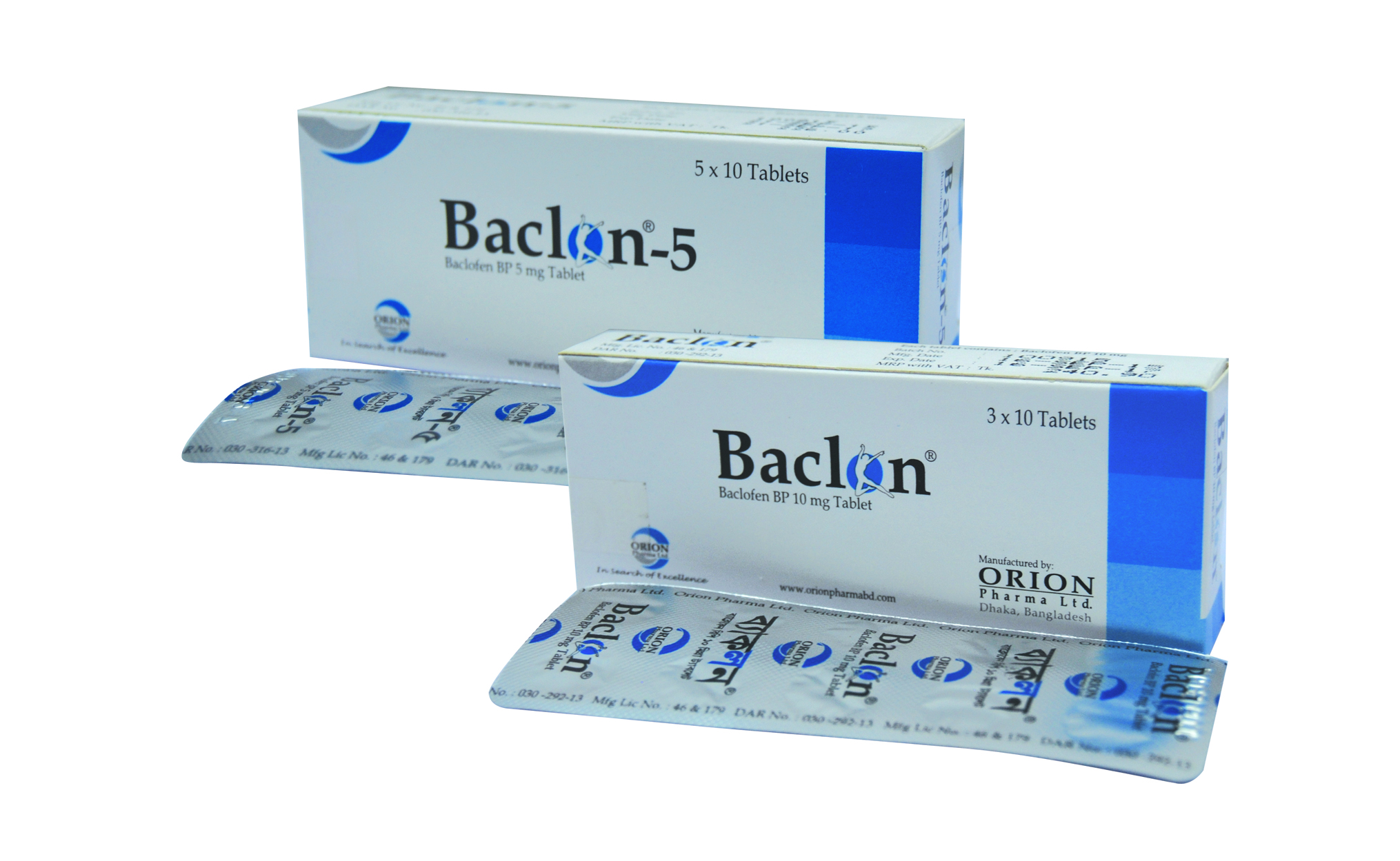

Baclon-5 Tablet: Each tablet contains Baclofen BP 5 mg Tablet.
Baclon Tablet: Each tablet contains Baclofen BP 10 mg Tablet.

BP

Muscle Relaxant

Baclofen is indicated to alleviate the spasms and associated pain, clonus, muscle rigidity and to improve the mobility in-
Baclofen is also indicated as in adjunct management of neurogenic bladder, in management of refractory trigeminal neuralgia.

Known hypersensitivity to Baclofen or to any of the ingredients.


<div style="\"text-align:" justify;\"="">Adverse effects associated with Baclofen are often transient and dose-related. They may be minimized by increasing doses gradually or controlled by a reduction in dosage. The most common adverse effects include drowsiness, nausea, dizziness, lassitude, lightheadedness, confusion, fatigue, muscular pain and weakness, and hypotension. Other adverse effects include euphoria, hallucinations, depression, headache, tinnitus, convulsions, paraesthesias, slurred speech, dry mouth, taste alterations, vomiting, diarrhoea or constipation, ataxia, nystagmus, tremors, insomnia, visual disturbances, skin rashes, pruritus, increased sweating, urinary disturbances, respiratory or cardiovascular depression, blood sugar changes, alterations in liver function values, and a paradoxical increase in spasticity. Problems with erection and ejaculation have also been reported with intrathecal Baclofen; these are usually reversible on withdrawal of therapy. Stopping Baclofen abruptly may result in a withdrawal syndrome. Epilepsy, progressing to status epilepticus, has been associated with the use of Baclofen in a patient who had no previous history of seizures.

Baclofen stimulates gastric acid secretion and should be used with caution in patients with a history of peptic ulcer and avoided in those with active peptic ulcer disease. It should also be used with caution in patients with severe psychiatric disorders or epilepsy or convulsive disorders since these disorders may be exacerbated by Baclofen. Liver function should be monitored in patients with liver disease; patients with renal impairment need a reduced dose. Baclofen should be used with caution in patients with respiratory impairment. Observations of increased blood sugar concentrations suggest caution in patients with diabetes mellitus. Care is also required in the elderly, in whom adverse effects may be more common, and in patients with cerebrovascular disease (who tolerate Baclofen poorly). It should be used with caution in patients who use their spasticity to maintain posture or to increase function. Urine retention may be exacerbated in patients with hypertonic bladder sphincters. Baclofen may cause drowsiness; patients affected should not drive or operate machinery. Abrupt withdrawal of Baclofen may result in a withdrawal syndrome and exacerbation of spasticity; dosage should be reduced gradually over at least 1 to 2 weeks, or longer if symptoms occur. Baclofen is considered to be unsafe in patients with porphyria because it has been shown to be porphyrinogenic in in-vitro systems.
Neonates: No information is available on the use of the drug in the neonates.
Breast feeding: The concentrations of Baclofen found in breast milk are small and UK licensed product information states that no undesirable effects are to be expected in breast-fed infants. The American Academy of Pediatrics also considers that Baclofen is usually compatible with breast feeding; no adverse effects have been seen in breast-feeding infants whose mothers were receiving Baclofen.
Pregnant Woman: The safety of Baclofen in pregnancy has not yet been established. Potential benefits should be weighed against possible hazards.
The elderly: Elderly patients on Baclofen appear to be more likely to experience adverse effects such as drowsiness. In elderly patients with cerebrovascular insufficiency, care is required as Baclofen may have hypotensive effects.

Alcohol and other CNS depressants may exacerbate the CNS effects of Baclofen and should be avoided; severe aggravation of hyperkinetic symptoms may possibly occur in patients taking lithium. There may be increased weakness if Baclofen is given to patients taking a tricyclic antidepressant and there may be an increased hypotensive effect if it is given to patients receiving antihypertensive therapy. Ibuprofen and other drugs that produce renal insufficiency may reduce Baclofen excretion leading to toxicity. Baclofen may be used in conjuction with Diazepam and other benzodiazepines.

Baclon-5 Tablet: Each box containing 5 X 10 tablets in blister strips.
Baclon Tablet: Each box containing 3 X 10 tablets in blister strips.
© 2025 Orion Pharma Ltd. All rights reserved.